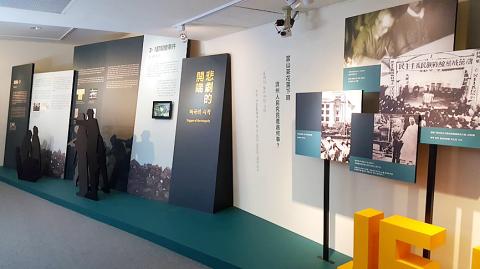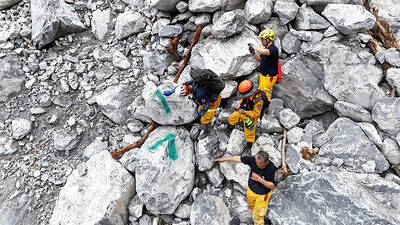The Taipei 228 Memorial Museum on Friday launched the “228 International Human Rights Exhibition: Jeju 4.3,” hoping that it will help Taiwanese to better understand the Jeju Uprising, which in South Korea carries the same weight as the 228 Massacre.
The Jeju Uprising began when the South Korean Labor Party planned gatherings to protest elections scheduled by the UN Temporary Commission on Korea and to commemorate the Samil Movement, or March First Movement, of 1919.
In an attempt to disperse the crowds, police fired warning shots, which killed six people, including a six-year-old child. The subsequent handling of the issue led to the uprising on Jeju Island, which began on April 3, 1948, and resulted in 14,373 civilian deaths.

Photo: Yang Hsin-hui, Taipei Times
The 228 Massacre began a year earlier in Taiwan when protesters were machine-gunned by security personnel on Feb. 28, 1947, at the Governor-General’s Office in Taipei. They were demanding the arrest of those responsible for the indiscriminate killing of a bystander in an angry crowd on Feb. 27 outside the Tianma Tea House (天馬茶房) on Nanjing W Road in Taipei.
The resulting crackdown by the then-Chinese Nationalist Party (KMT) regime left tens of thousands dead and resulted in nearly four decades of martial law.
Hsueh Hua-yuan (薛化元), president of the 228 Memorial Foundation, said he hopes everyone remembers the lessons of history and gives their support to Hong Kong, which is experiencing governmental suppression of human rights.
He hopes all countries in Asia can work together to create a future for themselves based on freedom and democracy, Hsueh said.
The exhibition would run for two years, Taipei City Department of Cultural Affairs Deputy Director Tien Wei (田瑋) said.
“By presenting information and pictures about the Jeju Uprising, we hope to prevent similar incidents and also reflect on whether the Hong Kong administration has overreacted,” Tian said.
Jeju 4.3 Peace Foundation chairman Yang Jo-hoon, whose efforts made possible the enactment of the Jeju 4.3 Special Law in 2000, said that the 228 Incident and the 4.3 Incident were similar, because many died due to state-sanctioned violence.
The truth of the 4.3 Massacre was considered taboo in South Korea, and he was motivated by how Taiwan dealt with the 228 Massacre starting in the 1980s, he said.
Yang said he hoped to organize an exhibit about the 228 Massacre in Jeju.

Former president Ma Ying-jeou’s (馬英九) mention of Taiwan’s official name during a meeting with Chinese President Xi Jinping (習近平) on Wednesday was likely a deliberate political play, academics said. “As I see it, it was intentional,” National Chengchi University Graduate Institute of East Asian Studies professor Wang Hsin-hsien (王信賢) said of Ma’s initial use of the “Republic of China” (ROC) to refer to the wider concept of “the Chinese nation.” Ma quickly corrected himself, and his office later described his use of the two similar-sounding yet politically distinct terms as “purely a gaffe.” Given Ma was reading from a script, the supposed slipup

Former Czech Republic-based Taiwanese researcher Cheng Yu-chin (鄭宇欽) has been sentenced to seven years in prison on espionage-related charges, China’s Ministry of State Security announced yesterday. China said Cheng was a spy for Taiwan who “masqueraded as a professor” and that he was previously an assistant to former Cabinet secretary-general Cho Jung-tai (卓榮泰). President-elect William Lai (賴清德) on Wednesday last week announced Cho would be his premier when Lai is inaugurated next month. Today is China’s “National Security Education Day.” The Chinese ministry yesterday released a video online showing arrests over the past 10 years of people alleged to be

THE HAWAII FACTOR: While a 1965 opinion said an attack on Hawaii would not trigger Article 5, the text of the treaty suggests the state is covered, the report says NATO could be drawn into a conflict in the Taiwan Strait if Chinese forces attacked the US mainland or Hawaii, a NATO Defense College report published on Monday says. The report, written by James Lee, an assistant research fellow at Academia Sinica’s Institute of European and American Studies, states that under certain conditions a Taiwan contingency could trigger Article 5 of NATO, under which an attack against any member of the alliance is considered an attack against all members, necessitating a response. Article 6 of the North Atlantic Treaty specifies that an armed attack in the territory of any member in Europe,

The bodies of two individuals were recovered and three additional bodies were discovered on the Shakadang Trail (砂卡礑) in Taroko National Park, eight days after the devastating earthquake in Hualien County, search-and-rescue personnel said. The rescuers reported that they retrieved the bodies of a man and a girl, suspected to be the father and daughter from the Yu (游) family, 500m from the entrance of the trail on Wednesday. The rescue team added that despite the discovery of the two bodies on Friday last week, they had been unable to retrieve them until Wednesday due to the heavy equipment needed to lift